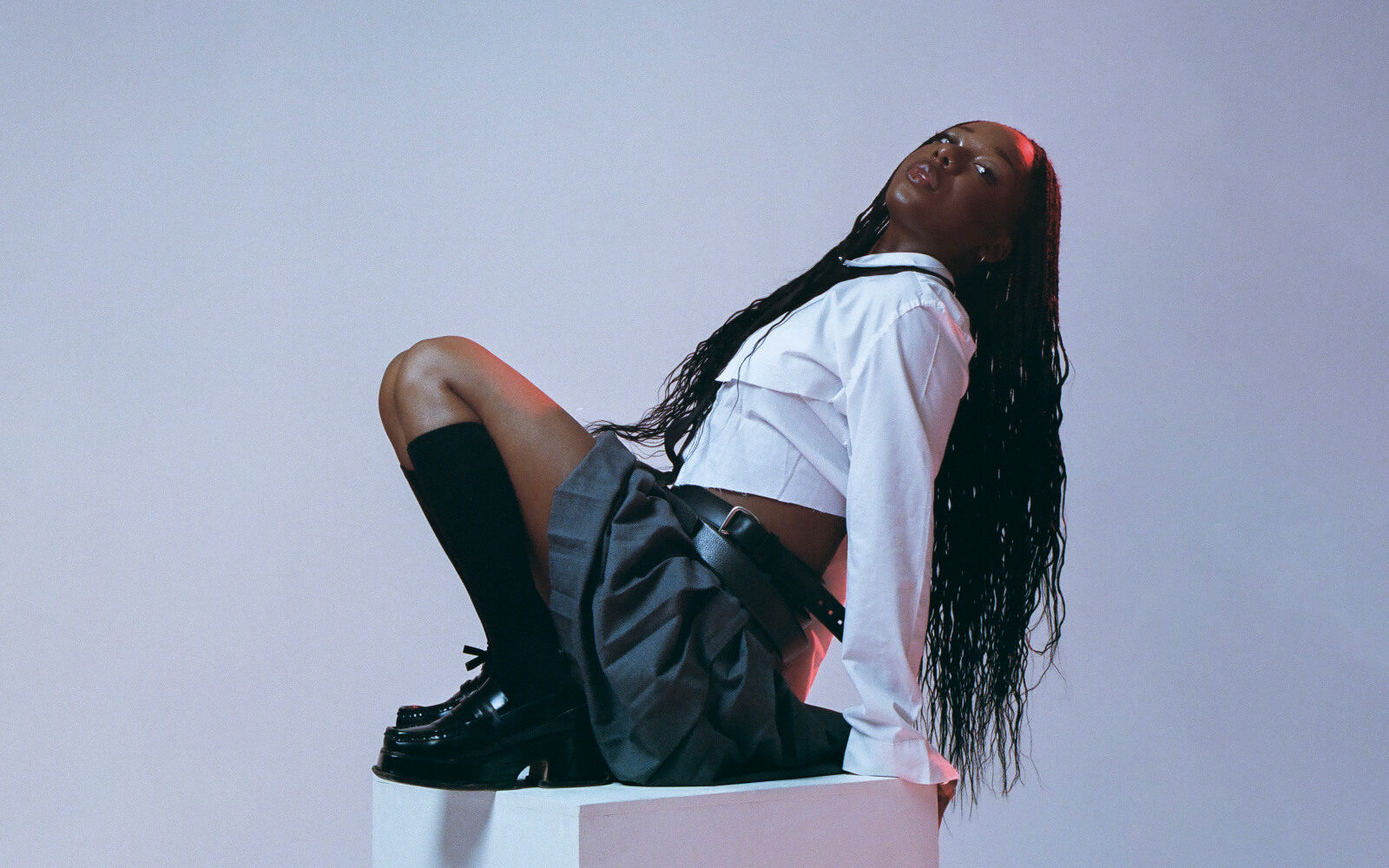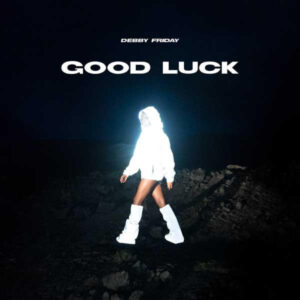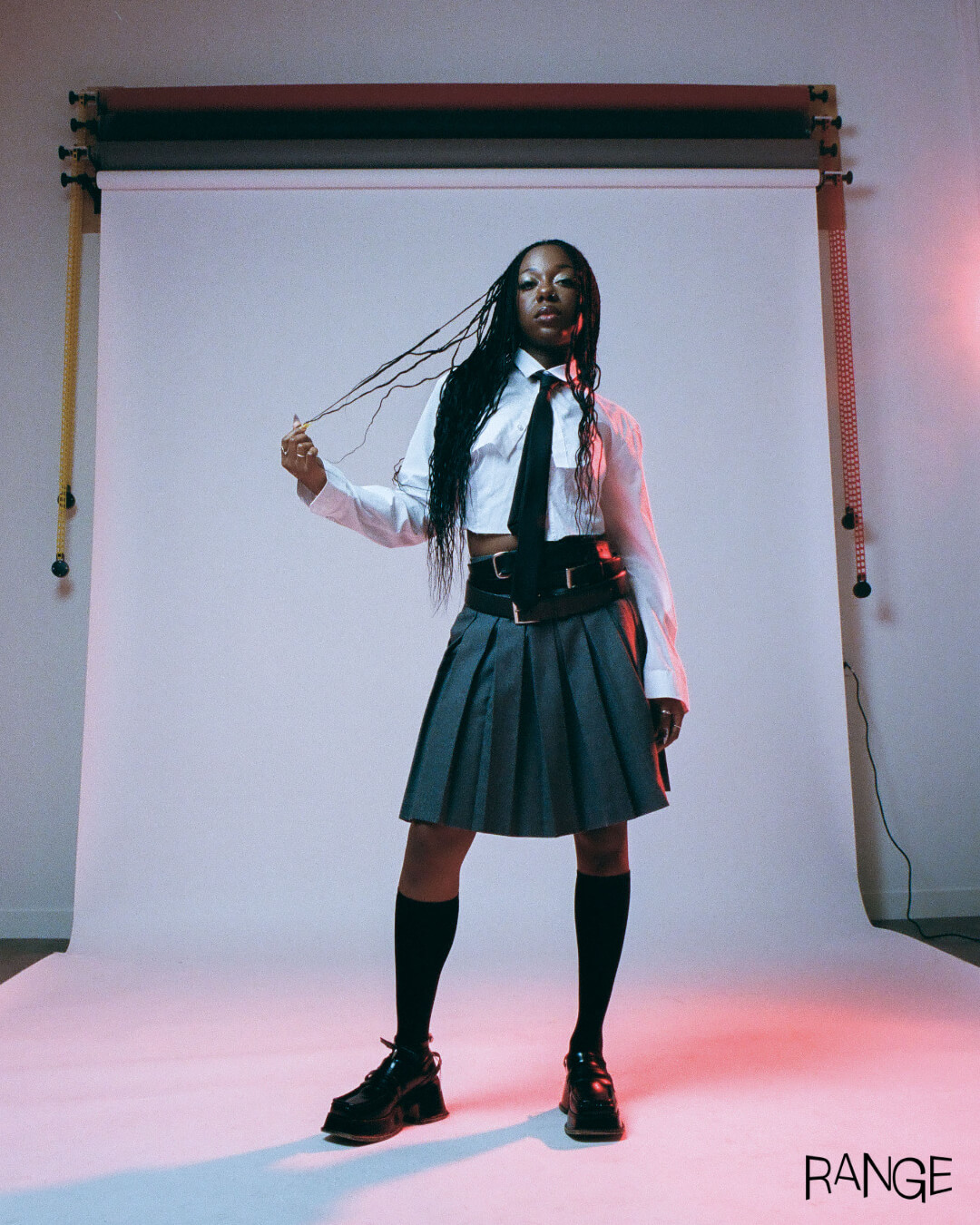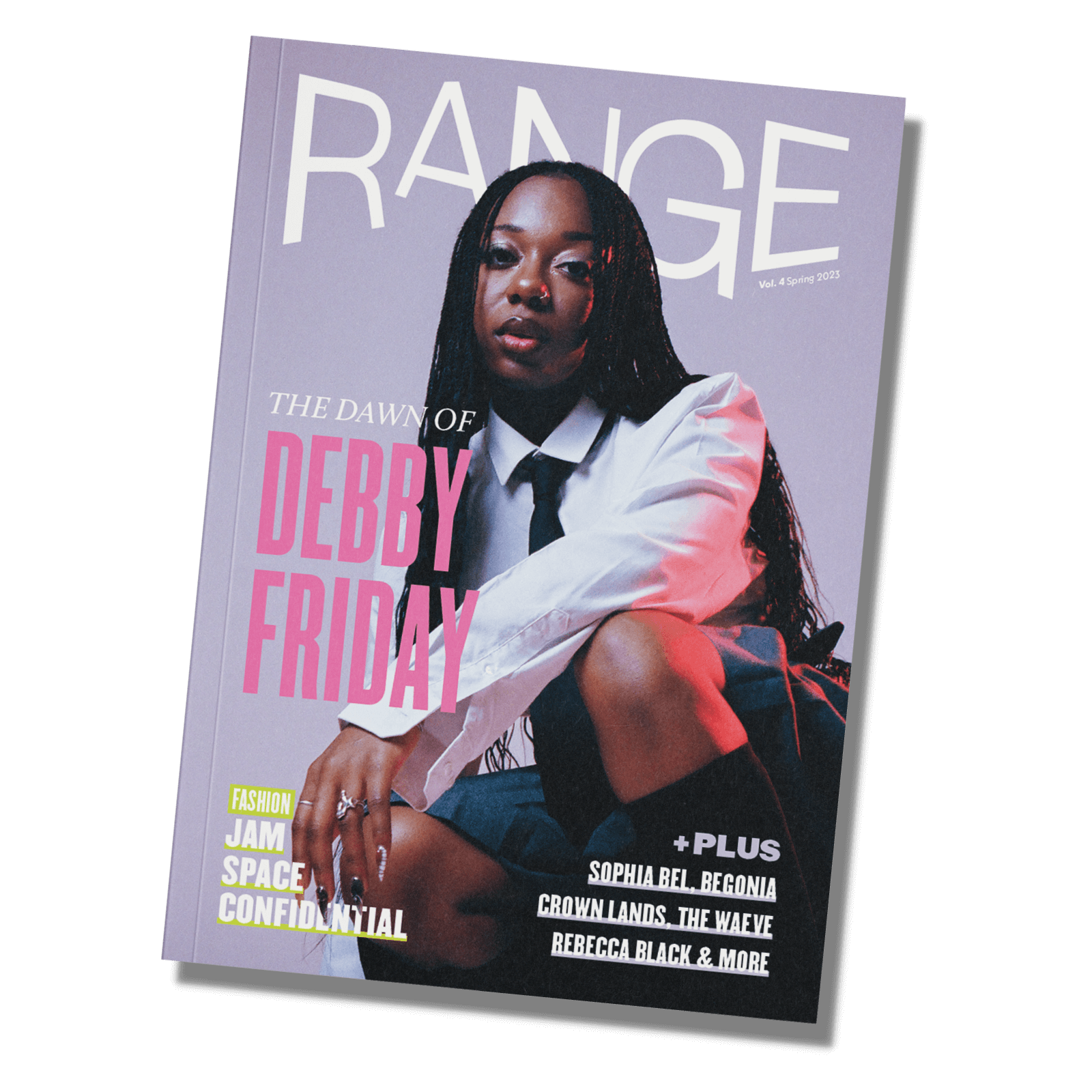By Cam Delisle
In the wake of her breakthrough third album, Through The Wall, the experimental-R&B auteur reflects on a career-defining year.

From scholar to international touring DJ, astrologer, and new media artist, Debby Friday embodies the spirit of DIY. The industrial rap maven is at once alluring and confrontational, exploring themes of loneliness, heartbreak, and self-forgiveness over wily, uptempo beats filtered through the lens and creative mind of a queer, Black person.
Bubbly and chameleonic in person, Friday is sipping tea at the White Lily Diner in Toronto’s Riverside neighbourhood after a three-hour photoshoot with RANGE. Calm and composed, she seems happy to be sitting down and taking a breath. It’s one month before the release of her debut album, GOOD LUCK, and Friday sounds relieved that it’s finally seeing the light of day. “I’ve been waiting for this for a long time,” she says, taking a sip of her tea, her manicured, earth-tone nails accentuated against the contrast of the porcelain tea cup.  Friday built an underground fanbase after releasing her 2018 EP, BITCHPUNK. The self-produced tape carried an organic strain of rave-ready raps, thudding bass, and visceral lyricism delivered smoothly, or with a screeching howl.
Friday built an underground fanbase after releasing her 2018 EP, BITCHPUNK. The self-produced tape carried an organic strain of rave-ready raps, thudding bass, and visceral lyricism delivered smoothly, or with a screeching howl.
While her first record was freewheeling, with the ability to express herself under the bounds of anonymity, its success on Soundcloud led her toward a more opaque second outing on 2019’s DEATH DRIVE. “I’m a private person, even though I can be really extroverted. I think I was scared to show certain parts of me,” says Friday. “Now, with this album, I don’t feel scared anymore.”

GOOD LUCK (2023) out March 24 via Sub Pop.
Case in point: the first single from GOOD LUCK, “So Hard to Tell,” features a new revelation from Friday, swapping out her otherwise dry vocals for an R&B-influenced murmur while delivering self-reflective lyrics on the necessity of emotional support and community.
“It was a personal thing that translated into my art,” Friday says of the change in her tone. “I felt so much more solid as a person, and with that solidity comes confidence.” That confidence did not come without challenges.
Born in Nigeria, Friday spent most of her childhood in Montreal, but describes her family as “very nomadic.” The family moved around the boroughs of Montreal consistently. Friday says that this movement, paired with the immigrant experience in a province that can barely stand the weight of two dominant languages, created “a way of being that comes with rootlessness.” Friday describes Montreal’s grit and social intermingling as “a part of her context,” saying it doesn’t take a lot to live comfortably, although that is quickly changing with gentrification and inflation.
Before venturing into music, Friday found solace in the club, and after “clubbing and raving for a really long time,” decided to make the leap from patron to performer by learning how to DJ. The parties and collectives she would play for in her hometown and abroad opened her eyes to creative movements happening in cities across Europe and North America. “For the first time I saw all these communities of young people who are artists, and they were just making a living doing their art in this way that, at least before, just wasn’t a strong reality in Canada.”

The club became an alternative world with its own rules and ideas, full of non-normative voices and champions. Multidisciplinary by nature, Friday was committed to finding new niches, genres, and means toward self-expression, but never considering it a real career path. Witnessing similar creative visions play out around the world inspired her to bring this passion to her daily life. “After that experience, I was like ‘Hey, if they can do it, then I can do it too.’ It was really inspiring to me, just to see the way they had formed their communities and the way they were all working toward essentially doing their passions, their dreams.”
But the respite that clubbing provided quickly turned into a cautionary tale of raging and raving, one that Friday looks back on as “really intense,” despite it only being a nine-month stint. “The lifestyle I’m talking about… it revolves a lot around substance use but also self-destructive tendencies. And I was so steeped in it,” says Friday.
The image she evokes is a far stretch from the person sitting across from me in the diner. In speech she is measured and somewhat wistful, looking back at her primordial form with equal amounts of ire and empathy.
Her eventual detachment from the scene was less of a breakdown, and more of a calling from an outside force pushing her to change. “I went completely stone-cold sober. Something in my brain snapped, and I left Montreal.”

Friday relocated to Vancouver in 2018, earning an MFA at Simon Fraser University. Vancouver provided a sterile social landscape, contending with reno-victions, club shutdowns, and cliqued up interior circles. “And I found myself very interior when I was there,” notes Friday. “It was good for school because I could just concentrate and finish.”
Art school was something of a bucket list item for Friday. “I needed the experience of being in an environment where it was safe to fail, and safe to experiment,” she says. For the constant creative explorer, the academic environment allowed her to explore new technology like live-coded music while reigniting old habits of writing poetry. She also directed a short film, BARE BONES, furthering her experimental exploration.
All of these experiences are bound into her debut album GOOD LUCK. The club is still a conduit for many of the themes present, but her worldview seems to have widened, revealing an evolved, more intimately personal Friday. “LET U DOWN,” a stand-out cut from the album, began with introspection and reflection on the past, and continues exploring. “I was writing about letting myself down,” says Friday. “I wasn’t trying to put blame on myself necessarily, but I was trying to be like, ‘I know I let you down and I’m trying to do the best that I can to make that up to you.’” While much of the album was written from Vancouver, Friday’s move to Toronto in late 2022 made connecting with a wider range of artists and their various disciplines more possible. “That’s really important to me, having connections in both music and film and being able to interact with my contemporaries… it’s part of the way that I express myself and do my art.”
While much of the album was written from Vancouver, Friday’s move to Toronto in late 2022 made connecting with a wider range of artists and their various disciplines more possible. “That’s really important to me, having connections in both music and film and being able to interact with my contemporaries… it’s part of the way that I express myself and do my art.”
The album will also be released alongside an accompanying short film. While she declines to share many details, Friday will star and co-direct the story about a young woman and her masked lover. On top of the film and the album, Friday is also taking the GOOD LUCK experience on tour, her first since 2019. The immediate response from interacting with a crowd is something Friday missed during the pandemic-induced touring shutdown. There’s a UK stop and a Boiler Room session that she’ll be hosting and performing.
“I always saw GOOD LUCK as this multimedia project,” Friday says of the different pieces. “It was never just going to be the album or just going to be a film. It was very much a combination of things.”
As her first full-length album, Friday’s trademark sound is newly sharpened by layers of bluesy undertones with an R&B edge. For all the experiences and nuances that GOOD LUCK represents, it appears like a final destination, one that its creator has been moving toward for their entire artistic life.

Design: Erik Grice
Make-up: Myla Martin
Stylist: Angelia Jayasinghe
Gaffer: Zeik Inocencio
Special thanks to the White Lily Diner
By Cam Delisle
In the wake of her breakthrough third album, Through The Wall, the experimental-R&B auteur reflects on a career-defining year.
By John Divney
Still processing their debut album, Vancouver’s latest art-rock unit proves collaboration is the new rebellion.
By Cam Delisle
The elusive Kevin Parker soundtracks the self-medicated search for bliss on his fifth album, Deadbeat.